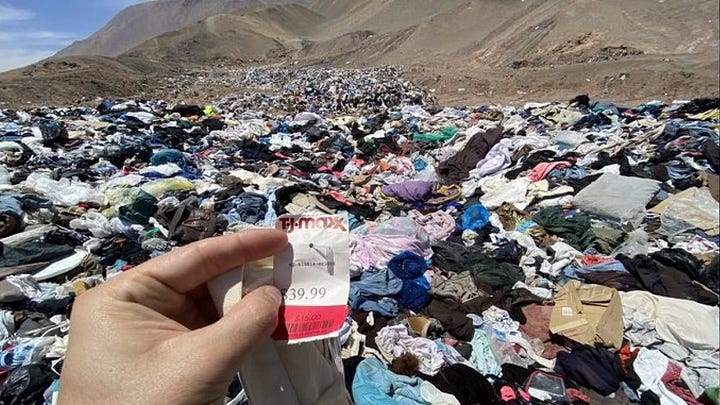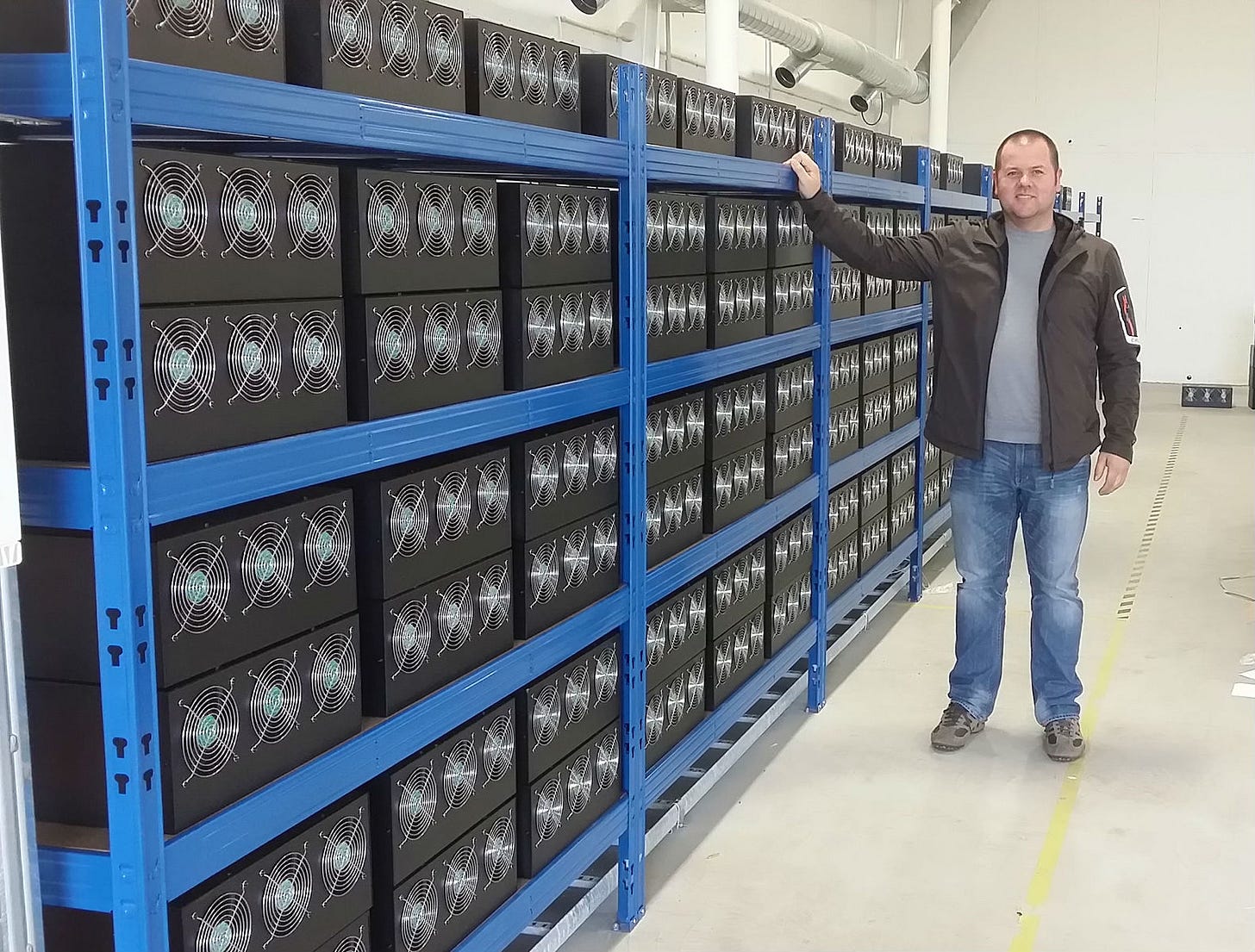Leo XIV, Integral Ecology, and the Logic of Sound Money
How fiat money fuels overconsumption, and why Bitcoin creates the imperative for clean energy and village life
Greetings in Christ, fellow pilgrims on this earthly journey. Last week, the online world saw a distinct “MAGA” vs. Pope Leo XIV climate drama unfold after our Holy Father featured prominently at a major climate change conference. The heated reactions compelled many to take sides; let us instead pause and consider the root of our current predicament through the lens of faith and reason. I’ve got two Bitcoin-related arguments for you: one on the past and present, and one on the future.
Argument I: The Fiat Incentive to Overconsumption
The past and present—correcting a broken incentive
I confess, brethren, my research into the intricate models of atmospheric CO2 and glacial melt is limited. However, it seems plausible to me that we are doing unnatural harm to our planet under the pervasive incentive structures born of our fiat monetary system.
For over a century, and with particular intensity since the final severing of the gold link in the 1970s, we have lived with the system called fiat money, which includes allowing fallen humans to try to calculate and set a central bank interest rate for their country. While this rate has tended to be lower than the natural market rate, most have accepted this rate as truth and bake it into their economic calculations. This means lower debt servicing costs and, often, taking on more debt.
When the cost of borrowing is artificially suppressed like this, it incentivizes a consumption spree beyond all natural bounds. It is as if the very speedometer of our economic engine has been tampered with to stay low, constantly urging us to accelerate past sustainable speeds, and even take wrong turns in haste.
This artificially low interest rate fuels debt and malinvestment—trillions and trillions of dollars worth—and, yes, the “throwaway” culture, on an epic scale, propping up industries and lifestyles that would not be viable. And these actions are cumulative! Thus, it does seem plausible that 100 years of going too fast does something.
An example that comes to mind is bad soil, a cause that has motivated even the most ardent critics of climate policy to champion regenerative agriculture. I myself was upset at this issue and still lament it. I became aware because some of my Bitcoiner friends, these ones known to reject the warming concern, saw that the overfarmed American soil that supports their carnivore plus root vegetables diet meant insufficient minerals and fragile health for them and their families. A simpler example might be garbage piling up in the desert. In both we see how the natural law, after all, governs not just our moral lives but the very fabric of creation. To disregard economic natural law is to invite disorder in other spheres.


The violence present in our hearts, wounded by sin, is also reflected in the symptoms of sickness evident in the soil, in the water, in the air and in all forms of life.
That’s from Laudato Si, which Pope Leo XIV continues to reference. Our Holy Fathers are rightly calling for an ecological conversion of heart. I confess that when I first “converted to Bitcoin” in 2020, I was only calling for a technological change—an assent to an inevitable incentive structure we’ll all eventually enjoy. I fell short. We must pair both: the conversion of heart and the technological solution.
Argument II: Bitcoin’s Imperative for Energy Stewardship
The future—adding a new incentive
With a fixed saving / investment / production / consumption-meter, we’ll slow down the plundering of Sister Mother Earth to a sustainable care. But the Bitcoin implementation of sound money offers more! As famous fiat finance turned Bitcoin-advocate Ross Stevens wrote in a memorable 2020 letter, Bitcoin’s energy use—often criticized—actually incentivizes affordable, abundant, and clean energy in a new way.
He acknowledges the concerns against Bitcoin’s energy use:
The amount of energy Bitcoin consumes is the sum total of the energy consumption of all the mining machines that secure the network. While hard to know exactly, a good estimate of the global total consumption is about 8-10 million people worth of energy. Absolutely enormous. In a warming world, how can this be good?
Then he addresses them at the most basic level:
First, the principle: Bitcoin is a better technology for performing central banking than the current government monopolies on central banking. In the same way that cars consume far more energy than the bikes and horses they replaced... Bitcoin’s better monetary system consumes far more energy than the current central banking system. Throughout history, energy use has grown whenever free people making free choices have decided for themselves that the price of the extra energy for the new technology they wanted was worth it. Today, every day, 24/7, Bitcoiners around the world make the decision that the price of Bitcoin’s energy use is worth it because Bitcoin is better technology for money.
He then calls readers to look beyond, to the transformative second and third order effects:
Second, the practice: Bitcoin mining is the only profitable use of energy in human history that does not need to be located near human settlement to operate. The long-term implications of this are world changing and hiding in plain sight.
Before Bitcoin, the problem of energy has never been its scarcity, but only our ability to channel it geographically where it is needed most… Because of satellites and wireless internet connections, Bitcoin mining can be located anywhere.
For example, remote, destitute areas blessed with moving water can monetize their natural resource good fortune by creating clean, hydro energy and using it to mine Bitcoin. Thus, Bitcoin can make monetizable isolated energy sources all over the world—like waterfalls, running rivers, or creatable dams—now entirely untapped because they would be cost prohibitive to connect to electric grids close enough to residential or industrial areas.
In doing so, Bitcoin can fundamentally change the economics of energy by introducing a highly profitable use of electricity that’s location independent… I believe the only long-term, profitable Bitcoin mining will be powered by hydro.
Imagine a future with Bitcoin mining firms, unsubsidized, in extraordinarily isolated locations—visualize a waterfall in a largely population-free part of an African country suffering from abject poverty—easily connected to the Bitcoin network, building serious energy infrastructure to monetize the local clean energy source for mining...
The net result can be people locating around new, Bitcoin-driven hydroelectric energy infrastructure, with more and more of humanity clustering around cheap, clean energy sources. Historically, our energy challenge has been to move the power to the people. With Bitcoin, we can move the people to the power.
Consider that the world’s major population centers… each developed where they are geographically because of natural seaports, waterways, and trade routes. Energy was a non-factor because placement of these cities was all pre-energy.
As Bitcoin finances the for-profit development of cheap, clean energy infrastructure on a massive scale, it can lead to a future in which more and more of the world’s population lives near abundant energy with an extraordinarily low marginal cost of production.
In summary, beyond the simple revolution of helping set a natural interest rate that discourages overconsumption that Bitcoin already represents, Bitcoin may also represent the biggest catalyst the world has ever known for developing abundant, clean, and cheap energy, which our Bitcoin economy can then thrive upon, which can also bring about a move away from the megacities.


Mr. Stevens finished the last quoted paragraph about abundant energy by boldly claiming, “This matters because cheap energy equals human flourishing.” Though not complete with my Catholic understanding now, I think he’s directionally correct if we add the change in heart, the change in heart perhaps pushed along by a new incentive system. Bitcoin—far from being an enemy of creation—is revealed as a monetary technology that aligns our economic incentives with responsible and sustainable development. It is a tool for stewardship, bringing forth resources from creation for the dignified advancement of mankind, a purpose wholly consistent with our Catholic teaching.
In Veritas Christi!

Learn more about inflation and Bitcoin
By the way, we’re currently reworking our course to squarely focus on inflation (which artificially low interest rates fuel), its spiritual effects, and the sins it can lead to. We’re excited to share with you what a summer of contemplation, study, and dialogue has yielded. Subscribe to be notified when it goes live.
David




